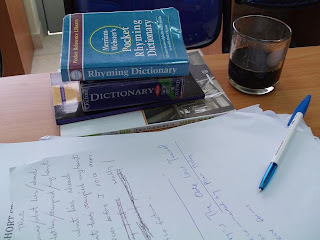
I have found that I am a methodical writer. I need time frames, outlines, charts, graphs and most of all - a nice hot cup of coffee with two creams and four sugars. Not everyone is like this, I know. Many of my students are not like this. They are "spur of the moment" writers. My students are very much the latter but need some of the former.
Last week, I gave an assignment for a prompted journal writing session. I gave the students the prompt, "When I look out the window I see . . . I hear . . . I feel . . ." The lesson focused around imagery and descriptive language. Some students wrote about the scaffolding around the school and how it makes them feel closed in while listening to the disruptive construction workers outside. Other students wrote about the skyscrapers and how they were reminded of the affluent residents of the neighborhood while listening to the sirens of the police cars, fire trucks and ambulances. Yet one student spoke of how she saw a sea of opportunity, the hopes of acquiring the "American Dream" and listened to the beat of the city that would feed her dreams one day. These were stories that were worthy of their own novels.
Unfortunately, many of the stories lacked descriptive language. Granted, many of my students lack the skills to write an effectively rich story due to deficiencies in syntax, grammar and a good command of the English language. But these same students have a creativity that leaves me flabbergasted most days. Many of them left last week, with a better understanding of one of the principles of becoming a good reader and writer. They also taught me something, too - take something small and expand it to make it big.
Like I said, I need structure as do most of my students. So I turned to some of the following sites to get some ideas:

The Snowflake Method- http://www.advancedfictionwriting.com/art/snowflake.php
This method is good for those of us who need to break up a large project into manageable pieces. The shapes are significant in that each polygon, from triangle to snowflake, has a designated writing element assigned to each vertex. It then delineates essential steps in the writing process that assures people, like me, some structure to their writing. This site has tips for the novice to the expert writer.
Novel Writing for Beginners - http://www.writerswrite.com/journal/sept97/keegan.htm
This next link is wonderful for those who have not been published, who have the beginnings of a novel or just need help in getting started. This site discusses writing in manageable chunks by beginning with short stories and then lengthening your writing over time. Please do not misunderstand the title. The author of this article simply wants people not to become discouraged by attempting to write at the level of Stephen King or J. R. R. Tolkien with their first novel. Not that no one can write at this level of expertise! I am pretty sure there are many who can.
For the novel writer who is in revision, here are some tips - http://www.writersdigest.com/article/4-steps-to-take-your-novel-to-the-finish-line/
I am not at this level but I am sure there is someone out there who is. *winks at the Naked Tart* I found these four simple tips to be really invaluable. I discovered that the tip, "Identify lulls in action where you can insert mini-scenes," to be really helpful. Take a look and try some of these strategies.
Where are you as a writer? What are some helpful tips that would facilitate the writing process? Inquiring minds want to know.
All images taken from Wikimedia Commons

8 comments:
Ohh I can't wait to check out some of these links. I like to break rules but it is nice to know the rules before I break them.
Oh yes--Chary, I definitely need that last, even if I am still SO RESISTANT to that micro-level of editing! It is probably why the suspense stuff isn't going yet... The Cozy was a different matter, as there was so much that HAD to be fit in that every scene needs to have something ANYWAY, but suspense isn't as technically formulaic, so it is easier to go off on a tangent.
I don't think I could do the snowflake method to WRITE, but I will have to look more carefully for revising... (believe me, there is plenty of revising to do)
Novel writing for beginners - that's exactly what I need >:)
Cold As Heaven
@ Jennee- You're such a rebel. I love it!
@ Tami- It's okay that some of these strategies or sites aren't helpful. We are all different writers and one needs to find what works for him or her. I just admire that you have the motivation and stamina to plug away each night. Go Tami!
@ Cold as Heaven- Yup, the novel writing for beginners was just right for me too.
Great post. Thanks for the links :)
Much of the Advanced Fiction Writing blog and site is incredibly helpful. I've had it bookmarked for a while. If you check out the Snowflake Method, I also suggest you read the article on "how to write the perfect scene."
Thanks for the links! I'm reading the third one now.
~IshanaTM
@ Vanessa- You're very welcome.
@ Ishanamaya- Thank you. Will look at the link now. :D
I definitely have to plan. The one time I didn't, I had 60,000 words that got completely lost, like a conversation that ran out of steam. So now I plan meticulously. But I find that makes for stronger stories. When I'm in the thick of writing I can't see the wood for the trees, but when I pull back and look down at the whole thing, helicopter-like, patterns emerge and I can see where to drop my surprises, plant my twists and plan my pay-offs.
Post a Comment